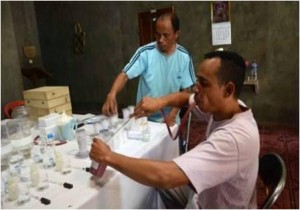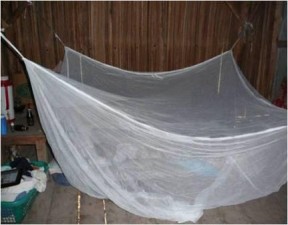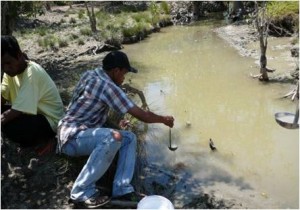National Malaria Control Programme in Timor-Leste receives a prize from the World Health Organization

The World Health Organization for the Southeast Asia Region (WHO-SEARO) has given an award to Timor-Leste's National Malaria Control Program, the 'Award of Excellence in Public Health for the Region'. This award by WHO (delivered on 10 September in the capital of Bangladesh) is a sign of recognition of good governance and exceptional achievements that Timor-Leste, as a Member State of the WHO-SEARO, has implemented with excellent results.
In 2006, 97% reduction of malaria incidence was detected among all tests conducted, corresponding to 223/1000 inhabitants. In 2013, this figure dropped drastically to 1,042 confirmed cases (i.e. 1/1000 inhabitants). This success was due, partially, to the introduction, in 2008, of monovalent Rapid Diagnostic Tests (RDT), followed by bivalent RDT, used in health centres throughout the territory since 2010. With the new national malaria control program, standard malaria treatment guidelines were reviewed and Arthemether Combination Therapy (ACT) was also introduced, and which, in 2007, contributed towards reduction of malaria cases registered, from 42% to 33%.
conducted, corresponding to 223/1000 inhabitants. In 2013, this figure dropped drastically to 1,042 confirmed cases (i.e. 1/1000 inhabitants). This success was due, partially, to the introduction, in 2008, of monovalent Rapid Diagnostic Tests (RDT), followed by bivalent RDT, used in health centres throughout the territory since 2010. With the new national malaria control program, standard malaria treatment guidelines were reviewed and Arthemether Combination Therapy (ACT) was also introduced, and which, in 2007, contributed towards reduction of malaria cases registered, from 42% to 33%.
In 2008 the Ministry of Health conducted a campaign in all health centres so that people suspected of having malaria would do a test before receiving treatment. This means that, in many health centres, health professionals stopped giving treatment solely based on malaria symptoms.
 Moreover, disease prevention measures were also performed, including the distribution of mosquito nets to pregnant women during prenatal care, and to 80% of the population living in areas at risk of the disease. Spraying (Indoor Residual Spraying) was also done in homes in five districts at risk of malaria (Covalima, Dili, Lautem, Manatuto and Viqueque).
Moreover, disease prevention measures were also performed, including the distribution of mosquito nets to pregnant women during prenatal care, and to 80% of the population living in areas at risk of the disease. Spraying (Indoor Residual Spraying) was also done in homes in five districts at risk of malaria (Covalima, Dili, Lautem, Manatuto and Viqueque).
To facilitate the regular checks of malaria evolution, the Ministry of Health created the Unit for Control of Microscopy Quality of Malaria at the National Laboratory. The existence of this unit also facilitates to WHO international technical staff providing support and ensuring quality control.
Staff responsible for the Malaria Program was placed in all subdistricts to ensure the implementation of the program to control this disease.
The success in reducing malaria cases was also due to financial support from the Global Fund to Fight AIDS, Tuberculosis and Malaria (Global Fund) and the technical assistance from WHO, specifically in relation to the national commitment in the Malaria Program at all levels.
The prize is awarded at the 67th Session of the Meeting of the World Health Organization for the Region of South East Asia (WHO-SEARO), on September 10, in Dhaka, Bangladesh. The ceremony will be attended by the Minister for Health, Dr. Sérgio Lobo.
When received the letter from the Regional Director of WHO, Dr. Sérgio Lobo immediately congratulated the team of Public Health and the Global Fund, responsible for implementing the national program for malaria control. The Minister said that the award is the result of the efforts of the Government in improving the living conditions of the Timorese: "This award belongs to all the Timorese."










































